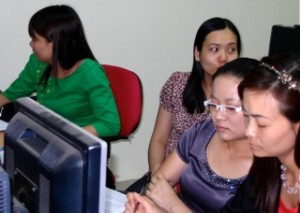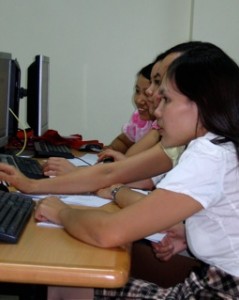A three-day workshop for the ?Improvement of skills for writing research papers in the Humanities for international journals? at the Learning Resource Center of Thai Nguyen University, Thai Nguyen, Vietnam required some readjustment of focus between Wednesday morning, May 26th, and Friday afternoon, the 28th, but the final session revealed students exceeding, perhaps, their own expectations. This correspondent, Sydney Plum, ably supported by Terry, offered this workshop as part of a series sponsored by Elsevier.
When I first starting thinking about this workshop, I scoured the shelves of the University of Connecticut?s Freshman English office for writing handbooks and stylebooks. The Norton Field Guide to Writing is one of my preferred handbooks, because of its clear presentation and its attention to the rhetorical stance of the writer. Professor Tom Recchio, the Head of Freshman English at UConn, recommended They Say / I Say: The Moves That Matter in Academic Writing by Gerald Graff and Cathy Birkenstein as another text.? Using these two texts I structured the workshop to introduce Vietnamese scholars to academic writing for Western journals as a way for them to enter into a conversation about the subject of their research.
The extended metaphor of the conversation was an apt paradigm for the workshop, as we proceeded from session to session discovering which skills needed the most attention. I had been assigned an aide and translator, Hoang Diem, and Diem?s translation and teaching skills were indispensable. Years of teaching half-day classes at Bay Path College (in the Saturday program) had shown me the effectiveness of worksheets. And I have been coached well by the other Professor Plum in writing these. So I had great support and good materials. Still, it was the flexibility of the overall construction of the workshop ? each unit somehow relating to the metaphor of the conversation ? that got us through to the end.
The ?Humanities? includes different disciplines in the Vietnam academy than in the West, so I had to make that difference clear. I was prepared for participants working in the social sciences and assured them that the characteristics of the academic journal article I would outline would broadly serve their needs. Thus, one conversation between participants and instructor early in the workshop allowed them to tell me what they were working on and where they needed guidance. This information allowed me to provide more examples of academic journal articles in their areas of interest ? by virtue of my having access to the UConn library databases from halfway around the world.
In addition to articles on Vietnamese literature I had arrived with, providing these additional writings on linguistics, history, economics, and teaching assessment was probably one of the most important functions of the workshop. By referring to the articles as I explored the writing skills they needed to develop, I was providing examples and reinforcing the necessity of writing in a very particular manner. Furthermore, using The Norton Guide as pedagogical model, I identified and described four different kinds of academic writing very early in the workshop. I used my own judgment in choosing reporting information, reviewing, arguing, and analyzing as the four genres on which I would focus. These were good choices.
I adapted an exercise I used with creative writing students to show the participants how to become better acquainted with the journals to which they might send their writing ? and how to frame their writing to meet the expectations and requirements of journals. And I spent some time talking about the different handbooks that would help them to write in English. Although I didn?t have copies of journals to show the participants (I had to rely on browsing the different websites), the librarians of the LRC were able to cull quite a few different writing handbooks from their collection, so participants were able to judge for themselves the differences between handbooks, stylebooks, guides to writing in specific disciplines, dictionaries of terms, and readers. Other than pointing out these helpful texts and the Norton website, I did not spend time on grammar. Nor did I spend much time on documentation or other ?nuts and bolts? aspects of the writing process. Although I went into some detail about what constitutes plagiarism in the Western academic tradition.
I had determined beforehand that I should focus on the essential rhetorical elements of academic writing. We worked through the kinds of academic writing; the conventions of academic writing; the importance of argument, analysis, and the thesis or research statement; and several formats for organizing academic writing. My brief lectures, the powerpoint slides, and the worksheets all underscored each participant?s position as someone knowledgeable about a subject who must present that knowledge to others in a certain manner. We were able, through discussion, to separate this scholar persona from their abilities in English, so that each of them could develop skills in this particular form of scholarly communication.
Even before I began the conversation that was the workshop, I had thought about the importance of repeating certain material for emphasis and to illustrate the analytic skill I was emphasizing. On Thursday I came up with one slide that was both summary and flow chart.
What is the problem?
- I do not know what kind of writing I should do.
- What is your subject?
- What kind of writing do other scholars in your field do?
- I do not know who I am in relationship to the subject and/or in relationship to the community of scholars.
- Consider your rhetorical situation: is it purpose; audience; genre; stance; or design that is the problem?
- I do not know what I am really writing about.
- Do you have a topic, but not a thesis?
- Have you tried writing down the different approaches to your topic?
- I don?t know where to begin with my research?
- Have you read other articles on your topic?
- I am having trouble writing!
I repeated the slide as one of the last on Friday. I told them that they could contact me for help with their projects as long as they could articulate what they needed help with, using the language of ?What is the problem?? We?ll see what comes of this gesture. However, even though I created this slide ?on the fly?, the fact that I created it represented my wanting to be in conversation with them and initiated discussion both times I projected it on the screen.
Due to the overlapping of the dates of the workshop with the last few days of teaching for many of the participants, there was some ebb and flow in attendance. I wasn?t able to get a sense of which worksheets worked better than others. I am not sure that even one of the participants was able to attend each session, so Diem and I were not able to judge whether the units worked incrementally. Perhaps the workshop might have been better titled ?Identifying writing skills?.? On the other hand, the writing skills that were stressed are essential to academic writing, and the participants left standing on Friday afternoon demonstrated their understanding of these skills and even, dare I say, their increased abilities.
Even though our focus was predetermined as preparing to write articles for publication in journals, I knew, as I put together the workshop, that I wanted to provide the participants with other options for the presentation of their ideas to a wider community of scholars. I wanted them to feel included in the academic conversation more quickly, and I wanted to reinforce the scholar- persona. So I outlined three different methods of presenting academic research ? the oral conference presentation, the powerpoint presentation, and the academic poster ? presented some guidelines on a worksheet and asked the participants in the final session on Friday to form groups and present their ideas for an oral presentation, powerpoint, or a poster.
This aspect of the workshop was a huge success. The participants interested in an oral presentation were all the literature people and they outlined an engaging presentation on the works of a major Vietnamese woman poet, whose writings have yet to be translated into English. In written form, their outline might serve as a proposal to a publisher. The librarians in the group got together to create a powerpoint presentation on the difficulties for academic librarians in Vietnam ? a presentation with tightly focused, insightful points illustrated by examples from their own experience. The participants who worked on an academic poster were the teachers of English who work in classes with too many students, thus they sketched a poster presenting the case for collaborative learning in ESL classrooms in Vietnam. Each presentation demonstrated analysis of the subject, an organizing statement, and an easily comprehended structure. The presentations of their group work were confident and as professional as our classroom permitted. They did this all in about ninety minutes (some were so anxious to continue working they rushed back to the classroom from our afternoon break)! And they were pleased with themselves and with each other. Obviously, I was thrilled. What teacher would not be ? leaving a workshop exuding empowerment?


